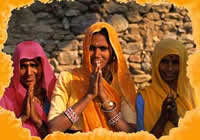Difference between Indian Culture and Western Culture
Key Difference: Indian Culture refers to the customs, traditions, religions and set of rules that are followed in India, while the Western Culture most commonly refers to culture that is followed in America and Europe.
This topic is always debatable and frankly there is never a winner as to which culture is better. Both are different types of culture and customs that are followed in different parts of the world. Indian Culture refers to the customs, traditions, religions and set of rules that are followed in India, while the Western Culture most commonly refers to culture that is followed in America and Europe. Both the cultures differ from each other in the traditional mindset, however, in today’s world both the cultures are coming to a mix. The Indian Culture has been dealing with westernization for a few decades now and the Western Culture has started developing a taste for the exotic Indian food and yoga.

Indian culture can be broken down into two parts; traditional culture and modern culture. Traditional Indian culture is the one that is followed in the rural areas of India, while modern culture is in the urban areas. The traditional culture has been on a continuous decline, with westernization play a huge part in an attempt to bridge the gap between different cultures. The Indian culture is one of the oldest cultures and has been around for several millennia. It encompasses various different cultures that are in the different part of the country.
Indian cultures place a lot of important on society; everything a person does has an effect on society’s perception of the person. Everything from going to a certain school, to dressing a certain way and even getting married, reflects the type of person you are to the society. Major religions part of the Indian culture includes Hinduism, Buddhism, Jainism, Sikhism and even Catholicism. Family is the second most important part of a person; from an early age a child is taught the importance of a family and the part he/she is expected to play in the family. Girls are most commonly taught about cooking, while boys are taught family business.
The Indian cuisine, now popular all over the world, has distinct and rich flavors full of spices. The cuisine varies from region to region; northern, southern, eastern, western and north-eastern. Food from each region can be distinguished by uses of different herbs, spices and cooking techniques. A variety of Indian food has also been influenced by Persians and Mughals. India is also popular for its desserts, known as mithai.
Marriages also play an important part in a person’s life. Arrange marriages still play a huge part in rural India, where families pick out a proper bride and groom for the children to marry with their children’s permission. Love marriages are gaining popularity in India specifically among urban areas. Since a major importance is placed on family, Indian cultures suggest living in joint families, where parents, male children, children’s spouses and grandchildren, all reside in the same house. However, nuclear families have started receiving more importance in urban families.
Clothing that is considered appropriate for women according to Indian culture, includes salwar-kameez, chudidar, saris and clothes that are not too revealing or tight in fitting. India is still a male-driven society and gender equality is something that is still being fought for by women in many rural places in India, where women are still considered lesser compared to men. This is changing, are more women are fighting for their rights to be considered equal in society. Indian culture is also popular for its various different colorful festivals that take place throughout the year.
 Western Culture received its start from the Ancient Greece and Ancient Rome, which spread under the Roman Empire to different parts of the world. It is heavily influenced by Christianity and was stagnant during the Dark Ages. The Renaissance in the 14-17th century is considered to have rebirth the western civilization, which was further promoted by the Scientific Revolution and the Age of Enlightenment. In today’s definition Western culture is most commonly associated with modern societies such as US, UK and Europe.
Western Culture received its start from the Ancient Greece and Ancient Rome, which spread under the Roman Empire to different parts of the world. It is heavily influenced by Christianity and was stagnant during the Dark Ages. The Renaissance in the 14-17th century is considered to have rebirth the western civilization, which was further promoted by the Scientific Revolution and the Age of Enlightenment. In today’s definition Western culture is most commonly associated with modern societies such as US, UK and Europe.
The core importance of Western Cultures are placed on individuals, they most commonly believe in making themselves happy first as an individual rather than trying to placate the society. A person does as he wishes and does all the things that make him/her happy, even if it does not please the society. Major religions that influence the Western culture are Christianity and Judaism. Similar to US being a melting pot for different types of people from different countries, Western culture is also considered as a melting pot of various cultures of different people from different countries. It includes cultures from India, Latin America, Europe, etc.
Cuisine also varies in this culture; however, meat is the core ingredient in almost all meals. Western culture includes cooking styles of Dominican Republic, Puerto Rico, India, Italy, etc. Every person has their own way of cooking a certain dish and ingredients can vary depending on the person. The flavors also vary depending on the ingredients of the dish. Western culture is mainly known for its popular fast foods such as burgers, tacos, hot dogs, pretzels, etc.
Western cultures mainly believe in nuclear families, where once the child reaches a certain age, they move out of their parents’ house into their own home. A child receives independence at the age of 18 and is considered as an adult at that point of age. Depending on the household, a child can either continue living there until marriage or move out at the age of 18. A child is also expected to start working at that age, at least part time along with college.
In this culture, a person also has the freedom to choose who they want to get married to, if they want to get married at all. All of the marriages are consented and love marriages. A person is not forced into a marriage under the consent of the parents. However, in the olden days, mainly for women, fathers used to choose an appropriate suitor.
A number of different festivals are also celebrated in the Western culture. These religions mostly have religions backgrounds such as Christmas (when Jesus Christ was born), Easter (when Christ was resurrected), All Saints’ Day, Valentine’s Day and Thanksgiving Day. Many festivals in Western cultures have lost the true meaning and have only become a commercial holiday, such as Valentine’s Day and Halloween.
In Western cultures, there is no differentiation between men and women as both are considered equal in today’s society. Though prior to this, women were considered lesser to men, it has not been so since the 1970s. Women also have the freedom to choose what they wish to wear; they are not limited to certain boundaries of dressing style. They are also free to wear revealing clothes, though not allowed to be fully nude in public.
Each culture has a set of negative and positive points. They are similar to the two sides of the same coin. No one culture ever surpasses the other culture, as it all depends on perception; to each person either culture could be better than the other one. Many people these days opt to take positive points from both the cultures and live as it suits them.
|
|
Indian Culture |
Western Culture |
|
Definition |
Indian culture is the traditional mindset of people that reside in India. It is the customs, traditions, ceremonies, festivals, religions of India |
Western culture started from the Ancient Greece and Rome, which then spread all over the world under Roman rule. It was then encouraged by the European civilization and now refers to modern way of thinking |
|
Origin |
Indian culture is one of the oldest cultures in the world. The traditions are several millennia old |
Though according to historical records ,western culture began with Ancient Greece and Ancient Rome, it is considered as a modern culture to many people |
|
Religions |
Hinduism, Buddhism, Jainism and Sikhism |
Christianity, Judaism |
|
Cuisine |
Indian food is heavily spiced and is rich in flavor. Major emphasis is put on having lunch |
Basis of food is meat; it is an essential part of every meal. More emphasis is placed on have dinner |
|
Family |
Traditional people usually prefer joint-families, while modern people are now living in nuclear-like families |
Most people believe in nuclear families |
|
Festivals |
Holi, Diwali, Navratri, etc. There a whole lot of festivals that are based on different events in the history; modern festivals are being accepted such as Christmas |
Christmas, Labor Day, Easter, Halloween etc. Also due to it being a melting pot a whole of other festivals are also celebrated |
|
Marriages |
Arranged Marriages are more common, compared to love marriages |
Love marriages are more common |
|
Society |
Society plays an active part in a person’s life. Every decision that a person takes , reflects what the society thinks about it |
Society does not take an active part. People take decisions depending on what they want, not what the society thinks |
|
Gender Equality |
Women are still considered unequal to men though acceptance of westernization is changing this idea |
Women are equal to men in society |
|
Castes |
Still have various castes, where one caste is lesser than the other caste |
No such thing as castes, all people are equal |
|
Clothing |
Clothing should not be revealing or tight |
A person can wear clothing according to what they desire |
|
Music |
Religious, classical, folk, popular, bollywood and pop music |
Is a melting pot and mix of all kinds of music from all over the world; includes rap, hip hop, pop, metal, rock, soft rock, alternate, etc |
|
Hierarchy |
The social hierarchy cannot be challenged. (ex: Boss has final decision) |
Hierarchy can be challenged at any point by anyone |
Image Courtesy: vagobond.com, bumimmusese.blogspot.com









Comments
Nice explanation. We should proud to be Indians.
Pranav
Thu, 07/24/2014 - 13:56
Indian culture is better than western culture
sundar
Fri, 07/11/2014 - 17:35
Although western culture is far more advanced in the path of gender equality, it is a false assumption that women and men are already equal in society. there are countless injustices that women and men face in the western culture making it untrue that there is equality. Western culture has it's problems and so does Indian culture. I am Indian and I was born and raised in America. I am not baised to either. Western culture is sometimes shameless, but has freedom. Indian culture is mysogynistic, and values reputation more than justice, but has more morale when it comes to peace and vegetarianism. Both have good sides and bad sides
sarah
Mon, 07/07/2014 - 01:36
I am not saying that we should accept western culture but why we are not ready to accept good things from western culture?
Alok Singh Sikawar
Tue, 06/17/2014 - 13:39
Any culture is not better and nither good this all culture self mind to depend that which things good and worng
dips
Tue, 06/17/2014 - 09:17
Maybe yes about Indian culture was been nice...
Rose-an M.Leon
Mon, 06/16/2014 - 14:16
i think Indian culture is best because in Indian Culture we respect Our Parents and Relative We Are Know Our religion. we have more than discipline.
bhavesh
Fri, 06/13/2014 - 18:26
I agreed with your thoughts.
Pranav
Thu, 07/24/2014 - 13:54
Nice Explanation keep it up :) :)
ravi
Sun, 04/27/2014 - 21:42
Western culture?
Haha . you call it culture?
Sleeping with anybody is what their culture is.
West is just a hollow manifestation. Eastern Culture is Indian culture is what is keeping the world together or by now world would have be destroyed fighting each other.
aziz
Fri, 04/11/2014 - 10:29
Pages
Add new comment